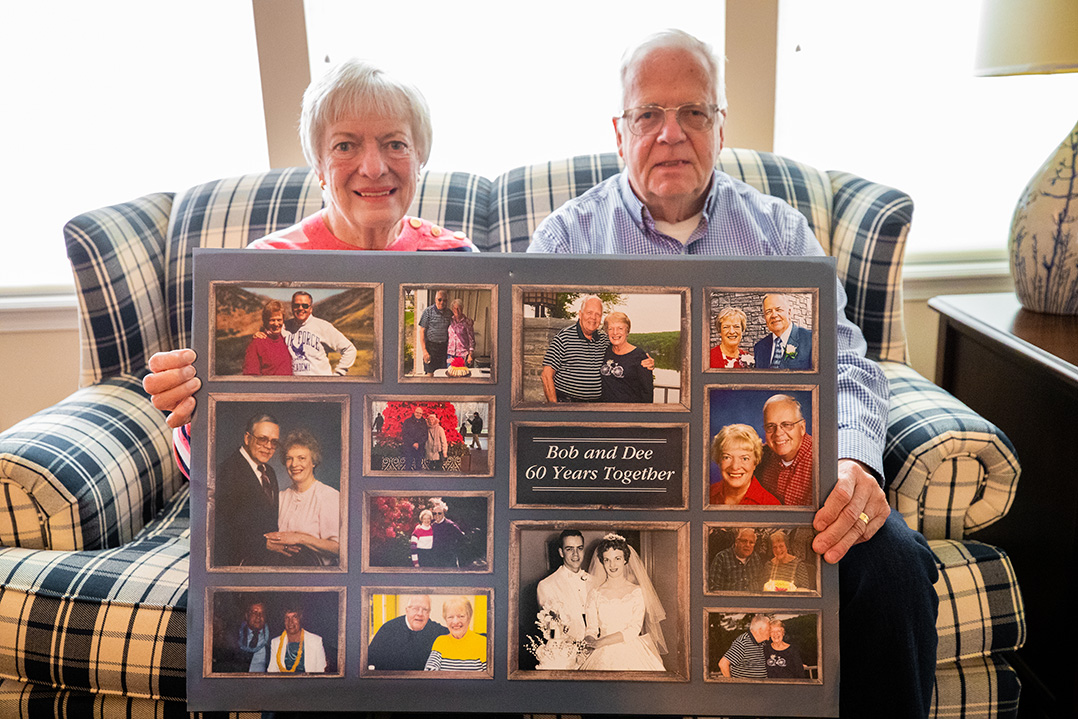By Chris Bavender
Bob and Dee Husselbee met on a blind date their senior year of high school.
“His cousin and my good friend were dating, and they fixed us up, and then I asked him to my prom and that was the start of it,” Dee said.
They dated for a little more than three years before getting married. They will celebrate their 62nd anniversary in June and their 83rd birthdays in July.
But life is different these days. Dee spends her time at their Fishers home caring for Bob, who has late-stage Alzheimer’s disease.
“He is now getting into the severe stage. It’s more advanced,” Dee said. “Some days I don’t know what to expect. The busiest time is the morning. He physically is able to still take a shower and shave and brush his teeth. But I have to prod him on and on and on, ‘The next thing you do is this, and the next thing is this.’ Fortunately, he is still ambulatory, but he does need a lot of help.”
It all started in 2010 when Bob was diagnosed in with mild cognitive impairment – an early stage of memory loss or other loss of cognitive ability in individuals who maintain the ability to independently perform most activities of daily living. It can be a precursor to Alzheimer’s or other dementia.
“MCI is a clinical diagnosis representing a doctor’s best professional judgment about the reason for a person’s symptoms,” said Natalie Sutton, executive director of Alzheimer’s Association Greater Indiana Chapter. “To diagnose MCI, physicians conduct a review of the patient’s medical history and use patient questionnaires, clinical exams and brief assessments to evaluate memory and thinking, such as changes in reasoning, problem solving, planning, naming and comprehension.”
Bob’s symptoms started gradually.
“I noticed he was starting to have a couple of problems, like one time watching something on TV regarding Halloween and he asked me if it came before or after Thanksgiving,” Dee said. “Other little things like trouble balancing the checkbook that just started to build more and more and progressively increased.”
According to a survey in the annual Alzheimer’s Association Report, more than 80 percent of Americans have little or no awareness of MCI. This year’s special report was the first time it examined both public and primary care physicians’ understanding of real-world awareness, diagnosis and treatment of MCI and MCI attributed to Alzheimer’s disease in the United States.
“The first thing people should know is that MCI is not a part of the normal aging process. In normal aging, a person may occasionally forget names and words and misplace things,” Sutton said. “With mild cognitive impairment, the person frequently forgets conversations and information that one would ordinarily remember, such as appointments and other planned events.
“People should also understand how common MCI is. It is estimated 12 percent to 18 percent of people ages 60 or older have MCI.”
Dee and Bob moved from Illinois to Fishers in 2013 to be close to their two daughters and five grandchildren. Having family nearby to help has been important to the couple.
“For example, I am in a book club, so one daughter comes to stay with Bob. And I am in water volleyball so I take Bob to my other daughter’s (home), so that’s nice that I can do things,” Dee said. “In fact, last summer our grandson Brady who is 13 now would come and stay with Bob for me while I did things. It was really sweet. He would plan the day, what they were going to do. He would make him lunch. It was really neat to see him do that.”
Dee said although there are some bad days, overall, she considers herself fortunate.
“I just feel like with any other disease it could be a lot worse. I think Bob has a kind, generous temperament. He is easy even though you have to tell him things over and over,” she said. “Some days are challenging but with the great support of family and friends and neighbors, we are managing well.”
The annual report can be found at alz.org/facts.

Family history sometimes plays a part
There is no specific treatment for mild cognitive impairment. In some cases, physicians can identify reversible causes of cognitive impairment, such as depression, medication side effects or sleep apnea. They may also recommend exercise and healthy lifestyle interventions to help improve cognitive function and quality of life, according to Natalie Sutton, executive director of Alzheimer’s Association Greater Indiana Chapter.
Bob Husselbee, who has late-stage Alzheimer’s that started as an MCI diagnosis, has a family history of Alzheimer’s. His maternal grandmother had it, as did two maternal aunts and a maternal cousin. His brother had mild dementia. His sister-in-law had Alzheimer’s in her early 50s and died at 62.
“I think because of my nursing background and sister being affected I was hypersensitive to some signs and symptoms that otherwise I might not have paid attention to,” Dee said.
Sutton said family history isn’t necessary for an individual to develop Alzheimer’s or another dementia.
“It is important to note that in the vast majority of cases, genetics raise the risk of developing the disease, but they do not necessarily mean that the person will develop the disease,” Sutton said. “However, research shows that those who have a parent or sibling with Alzheimer’s are more likely to develop the disease than those who do not have a first-degree relative with Alzheimer’s. Those who have more than one first-degree relative with Alzheimer’s are at an even higher risk. When diseases like Alzheimer’s and other dementias tend to run in families, either genetics, environmental factors, or both, may play a role.”



